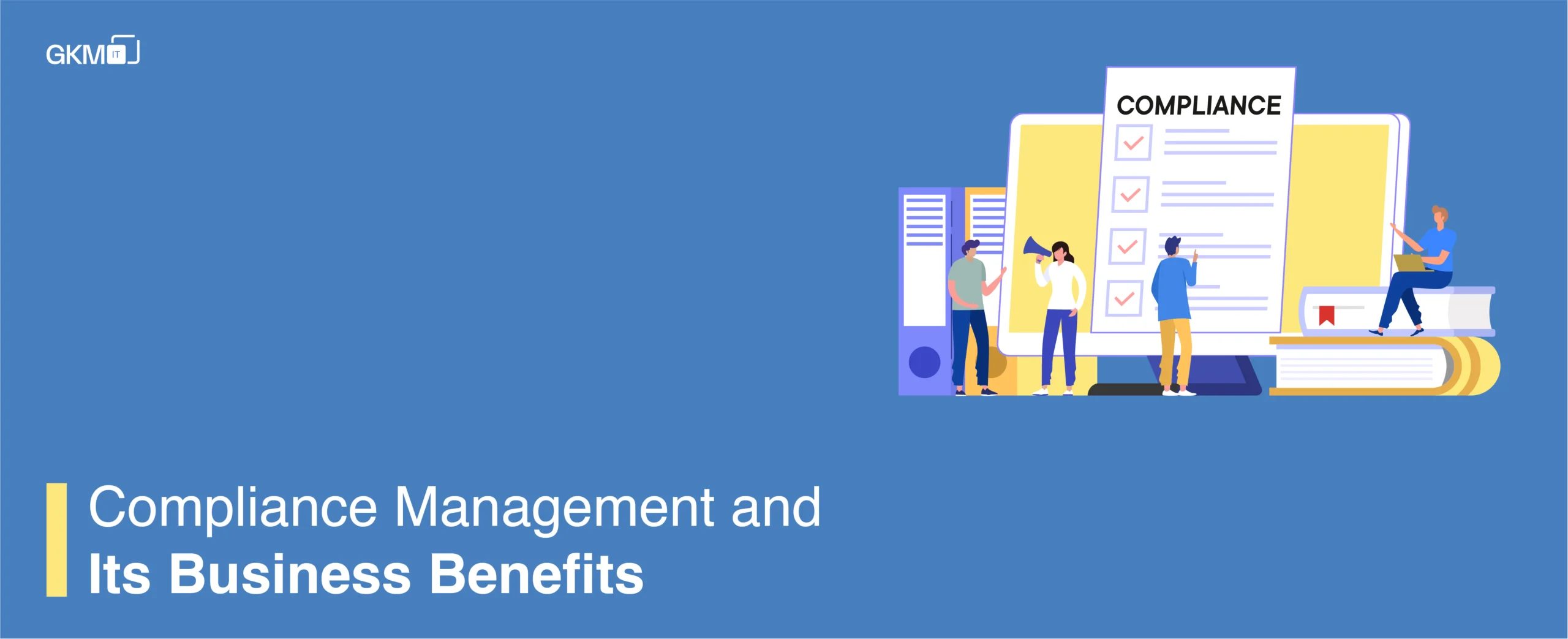
Compliance Management and Its Business Benefits
While running a business, we are more focused on customers, level of service and profit margin. In all these hustles, we sometimes forget to meet government-mandated IT regulations. Ignoring these regulations can prove fateful and costly. According to statistical research, the average cost of a data breach is $3.62 million.
Compliance management can help the business stay ahead of major problems and issues.
What is compliance management?
Compliance helps meet the industry’s rules, regulations, and obligations. In the IT world, compliance usually involves data security. No matter what industry you deal with, you need to take data breach seriously. When it comes to the protection of information, companies comply with federal laws.
Benefits of compliance management:

-
Avoid future cost by reducing legal risk
Through compliance, you can avoid legal risk. Fines and other compensatory penalties, lawsuits, and settlements can cost you millions of dollars. Even though you are able to pay these costs you will experience a dramatic fall in sales. If you can’t protect customers’ card details and fraudulent purchases, surely you will lose customers and trust in your brand name. The damage and aftereffects of the breach in the company can take years to repair. An estimate of monetary damages can’t be estimated easily. Thus, it is suggested to practice good data security and avoid a breach.
-
Helps build trust with the customer base
If you comply with federal laws, it will show your customers you care about them and you are keeping them safe. A record of compliance shows you are running a trustworthy operation.
-
Positive PR
Every customer looks for a safe and trustworthy company, and thus excellent reputation is a wonderful source of positive PR. An excellent PR plan creates positive stories for your company. Let your customer know if you are improving your data security system. This will relieve them while entering credit card details or bank account details.
-
Regular audits improve the company’s compliance
Through regular audits avoid any risk in your business. An IT compliance officer or professional will have a close look at the company’s cybersecurity. They will guide you whether you are complying with industry regulations. They will examine everything through federal law. This will help you make sure your system is not vulnerable to online threats. During the audit process, if they find any loopholes or weak spots they will help you shore up before a breach occurs.
-
Improve cybersecurity and engage with employees
With compliance management, employees can be a real challenge. A breach happens when an employee opens an email, which they should have deleted. Carelessness with the password or sensitive information can also result in fraud. Mobile devices can also be a reason for a breach. When you are thinking of improving cybersecurity work on bringing the workforce in the process. Let them know about the role and their importance in maintaining the organization’s data. Teach them how to secure company data and give them perks and benefits.
Activities involved in compliance management
- Internal audits
- Third-party audits
- Security procedures and control
- Preparing reports and providing supporting documentation
- Developing and implementing policies and procedures to ensure compliance
- Assisting in the procurement of BAA (business associate agreement with your cloud provider)
GKMIT compliance management process
- Understanding the scope of compliance required
- Audit of current processes and architecture
- Figuring out gaps
- Bridging the gaps and assisting in revamp required
- Documentation and spot checks
- Meeting all the criteria required by the certification authority
- Enabling and monitoring, regular training and documentation required
Challenges of compliance management
Maintaining compliance comes many challenges:
- Internal policies and laws and regulations can transform rapidly.
- Manpower, resources, training, and leadership is ensured effectively through compliance management.
- Proving compliance, which includes thousands of records, documents, systems, and processes, can be difficult and time-consuming.
- Compliance management is a never-ending process and requires more personnel resources when regulations grow.
- Compliance is expensive, in comparison to the costs of ignoring regulations and noncompliance opting for compliance is a better alternative.
Compliance management at GKMIT
We assess your entire business and provide a transparent window into processes and security loopholes that may pose a concern for various compliances like HIPAA, HITECH, PCI, GDPR, etc. Compliance management at GKMIT comprises a blend of procedures, policies, audits, security controls, documentation, and tech enforcements. Let us help you secure your organization’s PII and PHI data. We also focus on organizing and creating the business and technology roadmap that will improve your security posture and allow you to keep up with the constant security changes year after year. We also assist in the procurement and maintenance of compliance certificates.
GKMIT addresses several standard compliance regulations and frameworks:
- GDPR
- COBIT
- HIPAA
- PCI
- HITECH
-
HIPAA (health insurance portability and accountability act)
If you are in the healthcare industry, you are familiar with HIPAA. In this law, doctors, nurses, and other medical staff need to protect patients’ privacy all the time. It is important to keep a close watch on patients’ charts and not divulge sensitive information to others. In layman’s language, it means securing a data system and avoiding a breach.
-
PCI (Payment card industry)

If you accept credit card information from your customers, your business needs to meet PCI security standards.
Specific standards exist regarding firewalls, user passwords, anti-virus software, and more. You always have to store credit card information securely and virtually—never on paper.
Even point-of-sale devices need to come from vetted, approved vendors.
All parts of your business have to treat customer credit card information safely. The costs can be astronomical if you don’t meet these strict safety standards and your data is breached.
-
GDPR (General data protection regulation)

It is one of the most comprehensive government-imposed data privacy frameworks till date. It came into effect in 2018, and it protects the data privacy of EU citizens. Though compliance does not apply in European countries, but applies to those who process data in European countries. GDPR auditing is mostly self-driven. It is a four-step process that includes:
- Planning: Step-by-step, go through the law’s requirements and create a plan of action to own key processes and improvements.
- Gap analysis: Report any areas that are out of alignment and discover the gaps in company processes with GDPR requirements.
- Prioritize and remediate gaps: Based on risk level, rank and prioritize the key areas to remediate.
- Test new processes: After remediation, assess the effectiveness of the new processes that are put in place.
Key takeaway points:
If you are thinking your organization has the time and resources to conduct a compliance audit, then consider a few questions:
Does auditing help you enhance business by improving security and helping sales teams close deals? What is the cost of non-compliance? Based on our experience, we would suggest a company should be proactive about compliance by locking down policies and procedures and keeping customer data safe.
Related Blogs –
Highlights Of New Education Policy 2020
Running Effective Meetings 2024 Insights Session
Software Defect Life Cycle Problems Solutions And A Way To Bring More Business
Scrum Master Vs Project Manager Everything You Need To Know